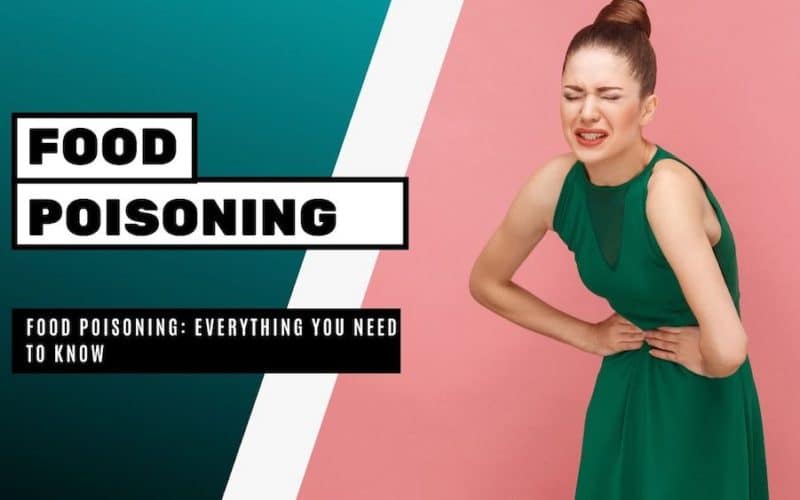There’s nothing quite like an upset stomach to wreck your plans for the day. Gastrointestinal upset can come from many things, from an infection affectionately called a “stomach bug” to a hangover. So, in this article, we will discuss the general understanding of food poisoning, its symptoms and what you need to do to prevent food poisoning.
Some people get stomach problems from emotional turmoil, some from severe headaches known as migraines, and some because they are exhausted or hungry. The most serious type of GI upset comes from food poisoning, however, and while this is rare, it’s important to recognize food poisoning symptoms.
Table of Contents
Understand the Food Poisoning
Foodborne illness, called food poisoning, is an acute disorder that happens after ingesting food or a beverage that is contaminated with a virus, bacteria, parasite or other toxins. By far, the most common sources of food poisoning are from E. coli and staphylococcus.
Foods can become contaminated in a number of ways including unhygienic preparation practices, food or water contaminated by human or animal feces, or meat products that have come into contact with an infected source while being processed.
Food poisoning symptoms are most commonly noticed after eating:
- Spoiled foods that have not been properly stored, such as mayonnaise at a picnic
- Undercooked meats
- Raw fish
- Improperly rinsed vegetables or fruits
- Food prepared unhygienically by someone who hasn’t washed their hands before handling different foods or after using the restroom
- Utensils that haven’t been properly washed after being used; these can carry the infectious source from one food to the next
While food poisoning can affect anyone, it is much more common among the elderly, the very young, or people who are immunocompromised because of HIV, cancer, diabetes, or other disease processes. Pregnant women must take special care to eat only properly prepared foods, as food poisoning can affect the developing baby as well, sometimes even leading to a miscarriage.
Food Poisoning Symptoms
Food poisoning symptoms can range from mild nausea to violent GI upset that can last from a day to several months. They can show up a few hours after eating contaminated food to a few days afterward, making it hard to pinpoint the exact source sometimes.
Most food poisoning symptoms include fever, nausea with or without vomiting, diarrhea, stomach cramping, fatigue, and headache.
More rarely, the symptoms can go on to develop watery or bloody diarrhea, difficulty breathing, and double vision.
The symptoms of food poisoning can mimic many other disorders, such as gallbladder issues, viral gastroenteritis, inflammatory bowel disease, and pancreatitis.
This can make it hard to diagnose your GI problems as the symptoms of food poisoning. To help narrow down the cause of the symptomology, a doctor can take blood samples or stool samples to check for the most common food poisoning culprits, but these test results can take weeks to come back.
While most food poisoning bacteria cause almost an immediate illness, some will lay in wait for days, weeks or even months before showing up. Luckily, these are rare:
- Hepatitis A: 50 days
- Shigella: Between four days to a week
- Campylobacteriosis: Between two and five days
- Intestinal cryptosporidiosis: Up to a week
- Cyclosporiasis: One to two weeks
- V. vulnificus: Up to a week
- Listeriosis: Within a few days, with the process worsening over the course of a few weeks
Should You See a Doctor for Food Poisoning?
While the illness usually clears up on its own, food poisoning symptoms are very uncomfortable. Your doctor can give you medications for nausea and vomiting, and an antibiotic if the illness is caused by a bacterium.
For the most part, though, you can stay home and rest, drinking lots of fluids. Remember that food poisoning symptoms are unpleasant, but they are the body’s way of expelling the toxins.
If you choose to stay home and recuperate from your food poisoning:
- Control diarrhea: Anti-diarrheal medications are widely available over the counter.
- Control the vomiting: Remember to eat the BLAND diet, eating low-fat foods, processed grains, poultry, fish and eggs, and low fiber fruits such as bananas.
- Hydrate: You will lose a lot of fluids and electrolytes while recovering from food poisoning. You must stay hydrated with water or electrolyte drinks
- Rest: It’s important to rest while you are recovering, even after the food poisoning symptoms have passed.
- Avoid things that will worsen the food poisoning symptoms: Caffeine, alcohol, dairy, high-fat foods or spices will only make your symptoms worsen.
A doctor’s visit is in order if you are in any of the high-risk categories, such as pregnant or immunocompromised. It’s also recommended to see a doctor if you have any of the following in addition to the normal food poisoning symptoms:
- Dehydration Symptoms:
-Dizziness, weakness or confusion
-Low blood pressure or rapid pulse
-Dark, concentrated urine - Diarrhea lasting more than three days or that contains blood
- Extreme vomiting (that won’t even allow you to keep fluids down)
- High fever, over 101.5 degrees Fahrenheit (38.6 Celsius)
Prevention from Food Poisoning
Most food poisoning incidents are entirely preventable by following a few common-sense precautions:
- Properly wash your hands before handling food, and between handling different types of foods
- Keep your utensils separated while cooking to avoid cross-contamination
- Make sure your water is filtered
- Store foods, especially meats and foods containing dairy, properly
- Cook foods to proper internal temperatures
- Use care when handling poultry, pork, raw fish, and oysters
- Wash and rinse fresh fruits and vegetables
- Wash cutting boards between uses; it’s recommended to avoid wooden cutting boards altogether. Opt for plastic.
- Make sure your dairy products are pasteurized (heated to kill bacteria before being sold)
Usually, food poisoning is just an inconvenience that will clear up on their own; any food poisoning symptoms that linger for more than a few days need medical attention.





